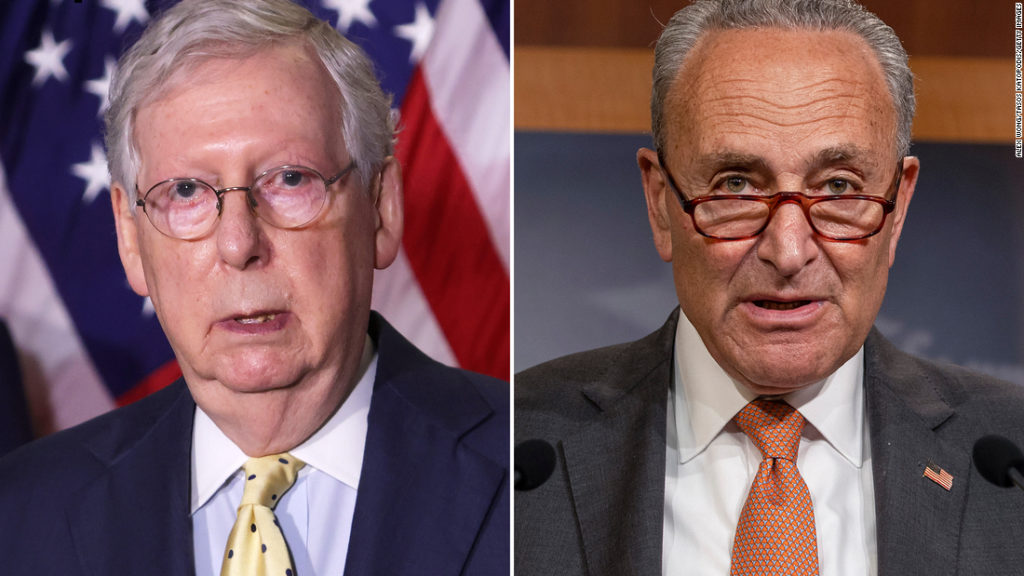
The Kentucky Republican said Tuesday that he was forcing it to show there already aren’t sufficient votes to convict Trump, which would require two-thirds of senators.
“I think there will be enough support on it to show there’s no chance they can impeach the president. If 34 people support my resolution that this is an unconstitutional proceeding, it shows they don’t have the votes and we’re basically wasting our time,” Paul told reporters.
Still, while the test vote is likely to be defeated, it will provide more clues about how many Republicans are open to voting to convict Trump, even if that number is short of the 17 necessary for the two-thirds needed to convict and bar him from running for office again. Several Republicans said they were surprised they’d already be taking a vote on the constitutionality, as the question is something that both the House impeachment managers and Trump’s legal team are likely to address in their presentations next month.
Senate Minority Leader Mitch McConnell has said he’s going into the trial with an open mind. But Sen. Roy Blunt of Missouri, a member of GOP leadership who is up for reelection in 2022, said Tuesday he would vote with Paul. The Senate will be voting on a motion to table, or kill, Paul’s effort to dismiss the trial.
The trial began Tuesday afternoon with the swearing in of Sen. Pat Leahy of Vermont, the Senate president pro tempore, who will preside over the trial. Leahy then swore in the rest of the Senate, and senators went four at a time to sign an “oath book” as jurors for the trial.
Republicans focus on constitutionality question
At their party lunch Tuesday ahead of Paul’s planned vote, Senate Republicans hosted conservative legal scholar Jonathan Turley, one of the lead scholars arguing that impeaching Trump when he is out of office is unconstitutional.
Turley has written extensively in recent days about his belief that while reasonable people can disagree about whether or not it is constitutional to hold an impeachment trial for a former President, he wrote recently on his blog, “even if the Senate does not view this as extraconstitutional, it should view this trial as Constitutionally unsound.”
Given the limited language in the Constitution on impeachment, legal experts disagree about whether the Senate can convict a former president. But Democrats have pointed to legal scholars on both ends of the political spectrum who say a trial is constitutional, because the Senate has held trials previously for former officials.
Sen. Dick Durbin, an Illinois Democrat, charged that Republicans were fixated on the constitutional issue because “they don’t want to be held accountable for President Trump’s incitement of a mob to attack the United States Capitol.”
“They don’t want to be held accountable on that vote so they’re going to try to make it another argument that is all about the Constitution,” Durbin said.
Several Senate Republicans say they agree it’s constitutional, including Sen. Mitt Romney of Utah and Lisa Murkowski of Alaska, who said her review “has led me to conclude that it is constitutional, in recognizing that impeachment is not solely about removing a president, it is also a matter of political consequence.”
Sen. Thom Tillis, a North Carolina Republican who just won reelection, said Tuesday, “I think there’s probably a constitutional basis for it.”
“I have more problem with the process and the expedited nature of it,” he added.
Several Republicans have pointed to the fact that Chief Justice John Roberts will not be presiding over the trial, while the Constitution says the chief justice should preside for the trial of a president.
“That would send a pretty clear signal to me what Roberts thinks of the whole thing,” said Sen. Chuck Grassley, an Iowa Republican, who declined to say how he would vote on Paul’s motion.
House managers prepare their case
At the first Trump impeachment trial, House impeachment managers also used video to bolster their case that Trump had pushed for Ukraine’s help to investigate his political opponent, Joe Biden. The use of video for the upcoming trial is even more compelling given the disturbing images and video that have emerged of rioters ransacking the Capitol and attacking police officers.
It remains to be seen how long the trial will last, whether the House impeachment managers will seek witnesses and what the exact contours of the President’s legal defense will be.
When the trial gets underway, one visible difference between the proceedings and Trump’s first impeachment trial will be that instead of Roberts, the president pro tempore of the Senate Patrick Leahy of Vermont will preside.
It would take a two-thirds vote in the Senate to convict Trump, a high bar to clear that looks increasingly unlikely to happen as a number of Senate Republicans are already arguing that it’s illogical and may be unconstitutional to impeach a former president.
Under the agreement reached by Schumer and McConnell, several ceremonial functions of the trial will take place this week. On Tuesday, the Senate is also expected to issue a summons to Trump, another step in the process of organizing for the trial to kick into high gear.
Then the trial will effectively be put on hold as the impeachment managers and Trump’s legal team exchange pre-trial briefs for two weeks. The final briefs would be due on February 9, allowing the trial to begin in earnest.
This story has been updated with additional developments Tuesday.
You may also like
-
UK coronavirus variant has been reported in 86 countries, WHO says
-
NASA technology can help save whale sharks says Australian marine biologist and ECOCEAN founder, Brad Norman
-
California Twentynine Palms: Explosives are missing from the nation’s largest Marine Corps base and an investigation is underway
-
Trump unhappy with his impeachment attorney’s performance, sources say
-
Lunar New Year 2021: Ushering in the Year of the Ox

